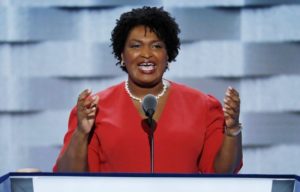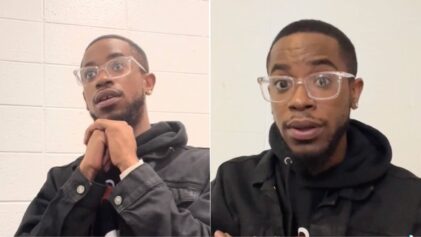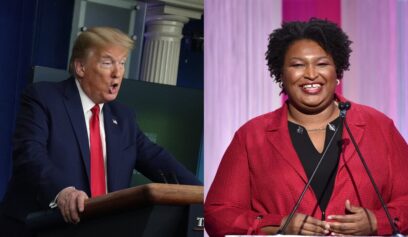
Georgia Rep. Stacey Abrams has made education and the economy core issues in her campaign to become the nation’s first Black woman governor. (Photo/Associated Press)
Georgia Rep. Stacey Abrams, Democratic minority leader in the House of Representatives, in early June officially launched her campaign for governor of Georgia, set on making history as the first Black woman governor in America.
Born in southern Mississippi as one of six children, her family moved to metro Atlanta for a better life when she was young. Educated in DeKalb County public schools, Abrams attended nearby Spelman College before earning a master’s in public policy from the University of Texas at Austin and a law degree from Yale.
First elected to the Georgia House in 2006, Abrams established a reputation among colleagues as an expert on tax and legal issues. She was elected her party’s House leader five years later. Along the way, she founded The New Georgia Project to register new nonwhite voters.
In 2012, Abrams received the John F. Kennedy New Frontier Award honoring young elected leaders. Last summer, she addressed the Democratic National Convention in Philadelphia. And in 2016, she was featured as one of “14 Young Democrats to Watch” in The New York Times.
The following is an edited version, for length and clarity, of an Atlanta Black Star interview with Abrams.
Q: What do you believe are the primary challenges facing African-Americans in Georgia and what do you plan to do to address them?
A: Twenty-five percent of the Black community in Georgia is below the poverty level. The next quartile to half is either surviving or just above heading into the middle class. What that means is we have to be intentional in understanding the barriers to progress in the community. We have to understand African-Americans in Georgia do not all live in the cities. We have very deep rural ties in our community. We have to be thinking growth not only in terms of pockets of poverty but also pockets of opportunity. Places where you have people who own their own businesses but can’t get the capital to expand. Places where you don’t have businesses because manufacturing left years ago and nothing has come in to replace it. Black people are the largest population after whites in Georgia with 32 percent of the population. If we can lift up our economy and our opportunities, we can transform the economy of the entire state. Central to that is also the conversation about education. Right now, we educate our community for low-wage jobs. We do not preconceive that they will go off to become tech magnates or the ones that will transform the economy. We train them to go work for somebody else. I think our education system has to be intentionally designed for excellence. We need high-quality day care so that families can work and not worry about what’s happening with their children. But also so those children are learning from their infancy. We have to expand pre-K [education] and we have to push for excellence in our K-12 schools and access to technical colleges, making that free and then making sure college is affordable. For the African-American community, education has always been the best predictor of our economic success. And then we have to defend civil rights, our rights to a government that works for us. So, for me, that’s an important point and a pillar for my proposed administration, which is that we have to fix government so that it works for everyone.
Q: Voting rights have been a big issue in Georgia as a voter ID law was enacted several years ago that some deem as restrictive. Registering voters has been a priority for you. How would you ensure Black voters and others are not purged from voter rolls?
A: We have to take back our government and that means taking back the [Georgia] Secretary of State’s office. The Secretary of State actually controls the conversation about voting rolls. I’ve worked hard to push theSecretary of State’s office to do a better job of what they do. Not only registering voters but restoring canceled voter registrations and trying to prevent precinct movements that make no sense. In Macon, they tried to move a precinct into a sheriff’s office and The New Georgia Project was able to fight back and have it put into a school. But we have to understand the different roles that people play in government and one of those roles is making sure we have a Secretary of State who believes in voting rights and not voter suppression. Certainly not purging citizens from voting rolls. That responsibility is one that we all have to have. I’m proud to have created The New Georgia Project, but I’m even more proud that it’s now a standalone organization able to fight and continue that fight on a broader scale.
Q: There have been deep cuts to public education in Georgia over the years. Should that trend be reversed and how would you fund an increase?
A: I’ll give Gov. [Nathan] Deal credit because he stopped the bulk of the austerity cuts. We’ve started to fill in the deep hole that we dug. So, I believe that we have to reverse the austerity cuts. We have a deeper problem, which is that we have never fully funded our current funding formula. That requires that we think about how we invest differently and how we rearrange our priorities in our budget. Georgia has a challenge facing a lot of states because of the state/local match — we [the state] put in about 51 percent, the local government puts in about 49 percent. The local government can only fund education through property taxes. Well, if you’re in an impoverished community, property taxes aren’t enough. The state has tried to step in and shore that up, but we haven’t done that effectively. That’s why having conversations about public education is also a conversation about the economy.
Q: How do you make sure Black residents are not left behind as the state continues to recover from the economic recession?
A: We do so by thinking more broadly, thoughtfully and innovatively about our economy. Right now, we see two solutions to growth. One is to steal jobs from other states and then announce that we’ve done something miraculous. The other is to invest in high tech through angel investing and venture capitalism. The problem is you’re only solving for two parts of the economy and you’re leaving the majority of the economy out. My focus is on entrepreneurship and not in an esoteric way, but in a very real way. Anyone who starts a business is an entrepreneur. Anyone who is successful in that is a business owner. And we need to multiply the number of business owners that we have, especially in the Black community, because small businesses are the No. 1 employer in the state. That means we have to ensure access to capital to start the business, access to training to manage it effectively and access to support when businesses start to grow. Because one of the other challenges is that we have a lot of good, small businesses that can’t afford to expand because they can’t get access to capital and they also don’t know where to go. An effective economic development strategy, especially in the Black community, looks at where do we sell, to whom do we sell and what do we sell and shoring up all three of those up to expand the economy not only among the Black community, but where we’re located.
Q: There is a belief that the dramatic cuts in President Donald Trump’s proposed budget could particularly harm low-income African-Americans. How would you combat them if they were enacted and continued during your tenure as governor?
A: The proposed budget is grotesque, it is mean and it is dead on arrival. So, the reality is you can’t simply target one state. His budget would hurt states across the country and I believe that our Senate, if not our House, would push back. But we do have to prepare ourselves for reallocation, redistribution and for a decision that the protections we’ve come to enjoy could disappear. To that end, we have to be an independent state that is thinking strategically about where the cuts would happen and how we can take care of ourselves in the state. Until 2020, we’re stuck with who we’ve got in the presidency. Were I elected in November 2018, my mission would be to make certain that it’s painful for him to make choices that hurt us, but also that we’re prepared to move forward regardless of what happens. The Black community is an extraordinarily resilient community. We have survived the worst horrors that any society can exhibit upon its own people and we do well anyway. But I want us to do more than just survive, I want us to thrive and my mission would be every day to create a state where everyone is lifted up, especially those who have been the backbone of our community and that means the African-American community.
Q: The state has passed criminal justice reforms to move away from past lock-them-up-and-throw-away-the key policies. But is there more that can be done to reverse our system of mass incarceration?
A: Absolutely. I again give Gov. Deal great credit here. He has led the nation on criminal justice reforms. I had the privilege to serve on the Criminal Justice Reform Council, Probation Reform Task Force and I serve on the Judicial Nominating Commission. Those all are appointments made by the governor. The reason that I think he put the leader of the Democrats of the House on those committees is No. 1, I have demonstrated a capacity to work with Republicans when it’s in the best interest of the people we serve, and No. 2, because I understand how critical criminal justice reform is. When every other state was doing three strikes you’re out, Georgia decided we wanted to do two strikes. That was in the 1990s. That was a terrible decision and it has made Georgia the fourth-largest state for incarceration. … Those are trends that have to be reversed, but reversing those trends also means being ready to help those families re-enter society and helping keep families out of the criminal justice system. I believe that we need to continue to think about how we use private probation and private prisons, but also basic things like bail money. Bail money is a scourge and it is unnecessary in the broadest number of cases. We have to think about how we criminalize traffic stops and whether or not we should shift our focus to people we’re afraid of and not people we’re mad at. So, I will make criminal justice reform a critical part of my platform. That’s part of what I consider good government. The government is about fighting voter suppression, reforming criminal justice and expanding Medicaid so that people have access to health care, which is a right and should not be a privilege. For the Black community, if we solve those problems, tackle them head on and with a clear eye toward possibilities, we can improve our economy and education, and we improve our quality of life. That fundamentally is what people want.
Q: What would it mean to you personally to become Georgia’s first Black and first woman governor?
A: I have been privileged to be first in a number of areas. I was the first woman to lead either party in the General Assembly, the first Black person to lead in the House of Representatives, and, if I’m elected, I will be the first woman and Black governor [of Georgia] and first Black woman governor in American history. But all of those I use as signals for what’s possible. I’ve done my job when I’ve opened the door for others and leave it open. When people feel that they can do more, when I redefine what leadership looks like so that young Black women, young Latina women, young Asian women, young Black men and young white men. When people start to see themselves differently and know that they have the capacity to lead because they see my example. So, I’m excited because I have an opportunity to destroy stereotypes. But more importantly, I have an opportunity to serve. At its core, service is why I’m doing this. I was raised by parents who told us no matter how little you have, there is someone with less. It is your job is to serve that purpose. For me, that ethos means I’ve been privileged to be in a position where I can run for governor and when I win, I will send a signal to others that they can do the same.

